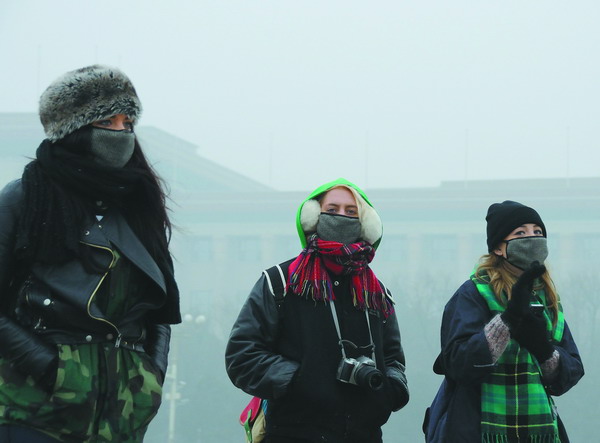

Beijing's smog is clogging the air and clearing out talent, especially expatriates with children. Belle Taylor looks at how pollution's human health implications extend to human resources.
 |
|
Foreign tourists wearing face masks visit the Tiananmen Square in heavy smog in Beijing, China, 29 January 2013. [File photo/China Daily] |
Tenna Schoer gave birth to her first child, Silke, in Beijing on a day the young mother describes as "300 plus". It's a term that would mean little to friends and family in her native Denmark, but Beijing residents would automatically know Schoer is referring to the PM2.5 reading - the standard by which the density of particles with a diameter of fewer than 2.5 microns is measured. The human body can't filter such small particles from the respiratory system. The World Health Organization considers a PM2.5 reading of about 20 to be healthy, so 300 is is high by any measure.
"I was very concerned," Schoer says.
"She has these tiny, tiny lungs, and we were very concerned about the long-term effects of (the pollution)."
Three days before Silke's first birthday, and 18-months after Schoer and her husband Michael had first arrived in Beijing, the couple relocated to Singapore.
Michael had asked the multinational Danish company he works for to transfer his family somewhere that was not so polluted even before his two-year contract in Beijing had been completed.
"He told (his company) about our concerns, and they were actually very helpful and very understanding," Schoer says.
"That's why we ended up here in Singapore. It's extremely better. Our doors are open all the time."
The Schoer family's story is hardly unique. As pollution levels in Beijing rise, so do the number of people leaving the city, particularly families.
Companies are reporting increasing difficulties in attracting staff - Chinese and foreign - to the capital, leading to concerns pollution is not only damaging Beijing residents' health but also the city's business competitiveness.
"It's a hotly debated issue within the chamber. This has been the case since earlier this year," Secretary General of the European Chamber of Commerce Adam Dunnett says.
"Our annual survey came out just after the Beijing aircopalypse took place," he says, referring to a period in January 2012, when PM2.5 levels reached record highs, leading to a mini exodus of foreigners from Beijing.
"The No 1 challenge for expatriates from our members' point of view is the living environment; 42 percent said they faced challenges in retaining talent, and 32 percent said it was the living environment that was the No 1 challenge."
Dunnett says the issue was highlighted during a recent visit to Europe where the chamber went to present a position paper.
"Normally we would talk about the regulatory issues in China but this time most of the focus was what is going on with the living environment in China in terms of the air pollution and the difficulties in finding the right people," he says.
Ivo Hahn, managing director for Greater China in the Beijing office of recruitment company Stanton Chase International, says the problem has grown over the past year.
"Air pollution and environmental pollution comes up very often," Hahn says.
"I have a case even in our own office of somebody - an overseas staff member - requesting to be transferred, and his concern is purely pollution."
Hahn says it's not just foreigners who are leaving Beijing. Many Chinese are also reluctant to move to the capital.
"Beijing gets quite a bit of heat in terms of skepticism from senior executives, particularly those with families," Hahn says.
"If we work on a vacancy for a client, we may contact 90 to 100 individuals, and so we see (the different) attitudes toward certain cities.
"I would say it's not just Beijing, but I would say you notice it more in Beijing because there is a more multinational population of senior executives."
Hahn says that while pollution is an issue in Beijing, smaller, cleaner cities are not necessarily attractive to foreign executives as they lack some of the facilities, such as international schools, Beijing has.
But it's not all doom and gloom.
William Gordon, director of the Beijing office of recruiters Robert Walters China, says the Chinese capital still has an allure for ambitious career builders.
"There are bad days of pollution in Beijing - that's not denied by anyone - but ultimately, living in Beijing, you've got the opportunities that come with it," Gordon says.
Gordon points out Beijing is an exciting prospect for people who want to experience working in the world's second-largest economy and have the chance to learn more about Chinese business culture. He says that while retention rates are an issue, pollution shouldn't shoulder all the blame.
"I think because it's such a competitive market," Gordon says of why companies find it difficult to hold on to staff.
"People who move from one job to another is certainly an indication of a boom economy."
Schoer made quick friends with other expatriates in her 18 months in Beijing. But a little over a year after leaving, few of them are still in China.
"I was in this mamma group (in Beijing), and we were eight ladies meeting up during pregnancy and following each other through birth and the first year," Schoer says.
"Out of those eight people, I think two are left now. The rest have left Beijing. I think most of the people who came about the same time or after us were surprised at the pollution levels."
For Schoer, the cleaner environment in Singapore means her daughter can play outside.
But she still feels affection for the Chinese capital.
"I miss Beijing a lot," she says.
"I loved it there."